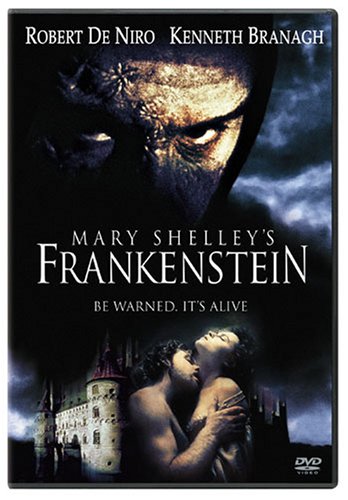Retrograde
The Resurrection of Frankenstein
by Daniel C. Smith

Mary Shelly's novel Frankenstein,
originally published in 1818,
has undergone more reincarnations (on film) than other story ever told
with the possible exception of the Bible, yet none of the movies that
have carried the name were true to the original novel, at least not
until this glorious adaptation originally released in 1994 (Tri Star
Pictures) and now readily available on DVD.
Directed by Kenneth Branagh, who, with the help of none other than
Francis Ford Coppola and the script-writers James V. Hart and Frank
Darabont (from
Bram Stoker's Dracula and The Shawshank Redemption,
respectively), created a cinematic masterpiece. But their version
represents more than a reincarnation; indeed, it is a resurrection of
one of the most important (and earliest) statements in the history of
science fiction literature. With Branagh directing and starring as
Victor Frankenstein and with Robert DeNiro cast as his creation (the
stellar cast also includes Aidan Quinn, John Cleese, Tom Hulce, and
Helena Bonham Carter), the film is as true to Shelly's milestone novel
as any movie adaptation of any novel I have ever seen.
And yet the movie is
far more than a simple homage or tribute to the original novel-- it's
accuracy demonstrates a far deeper respect-- both for the craft of
filmmaking and for the story of Victor Frankenstein. The
attention to detail in both the set design and costuming transport the
viewer back to the late eighteenth century where we find Victor
Frankenstein chasing his creation across the arctic ice cap,
temporarily rescued by Captain Robert Walton, who is crossing the
arctic in a magnificently recreated three-masted schooner for very
selfish reasons of his own. It was an age of rapid
advancement and conquest, and the captain and Frankenstein develop
quite a rapport as the doctor relates his hideous tale, one man of
conquest to another, and the movie unfolds with a narrative as powerful
as Shelly's own.
The film itself has a
beautiful textural quality to it that manages to evoke a certain
intimacy between the audience and cast, an intimacy that is not lost on
the smaller screens of our living rooms. The audience is
allowed to experience both the erotic and the grotesque nuances of the
novel in such subtle and yet powerful ways thanks to the incredible
camera work and innovative filming techniques that serve to bring the
viewer into Frankenstein's time and place, and more importantly into
hearts and minds of the characters.
From pleasant family
memories in the sweeping vistas of the Bavarian Alps of Switzerland
(filming also took place on the Welsh coast but was mostly done on
behemoth soundstages of England's Shepperton Studios) to the
near-medieval inner city of Ingolstadt, we follow the young boy genius,
Victor Frankenstein, on his voyage into manhood, a journey of
discovery, of triumph and tragedy, and of love and revenge, of life and
death… and life. For those unfamiliar with the
original tale (and you would be surprised how many people fall into
that category, even sci-fi fans), it will be an amazing journey of
discovery of who Dr. Victor Frankenstein really was, i.e., the
archetypical sci-fi protagonist, the prototypical anti-hero and
protagonist, the often tragic figure who questions and rebels against
the accepted dogma and practices of the day at great cost to
themselves, and sometimes to the world around them.
Branagh's portrayal
of this classic icon is spectacular, and De Niro's performance as the
'monster' created in his image is equally compelling. While
the juxtaposition of these two characters' and their struggle to come
to terms with the limits of their respective existences is the driving
force behind the plot of this story, the film does not overlook some of
the more underlying social themes that Shelly dared touch upon.
For any writer to
explore such themes was risky, but for Shelly doubly so-- remember,
1818 was not the most enlightened of times in spite of the leaps
forward society was making; the lady was a pioneer of not just science
fiction but women's suffrage as well.
Mary Shelly's novel
is as important today as it was then, if not more so, and this movie
accomplishes the difficult task of making a statement about times past
that is still relevant in the present-- the vitality of the story is
never lost in the majesty of the film itself, and cast and crew should
be proud to have been a part of producing something that stands as a
true work of art.
It goes without
saying that I feel this movie is a must-see if not must-own DVD for the
sci-fi collector, but I also want to encourage a reading of the novel,
especially for those who write speculative fiction. For such
a writer to be unfamiliar with such a great work is akin to wanting to
be a great trumpet player without knowing who Miles Davis is-- it can't
be done.
At least-- it
shouldn't be done.
© 2011 Daniel C. Smith
Daniel C. Smith has published over a hundred stories, poems, articles and reviews in venues such as Bare Bone, Tales of the Talisman, The Leading Edge, Star*Line, and Space and Time.
Comment on this story in the Aphelion Forum
Return to Aphelion's Index page.
|




